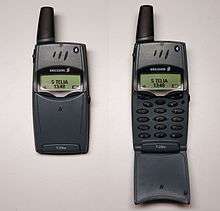Ericsson T28
The Ericsson T28s is a GSM dual-band, compact flip mobile phone manufactured by Swedish telecoms company Ericsson Mobile Communications in 1999.

Description
The T28 was the lightest and slimmest mobile phone at the time, with a weight of only 83 grams.[1]
Unlike many mobile phones of the time (1999–2001) it had a fixed, stubby external antenna. It was probably best known as the first phone that used lithium polymer batteries. At one point, it was the best selling mobile phone in America.
In terms of market positioning, Ericsson designated this as a premium phone, as such it was priced substantially higher (often more than triple) the price of the T10 and T18 devices - their nearest cosmetic and functional competitors. It has a tiny LCD screen and an spring-loaded latch mechanism to release the 'flip.'
Models
Four different versions of the T28 were sold. T28z was compatible with GSM1900 for use in North America. T28s was compatible with GSM900/1800 for use in the rest of the world - this is by far the most common version. T28 World was compatible with GSM900/1900 for use worldwide on GSM900 and North America on GSM1900 (this was the second World phone Ericsson introduced, the first being the I888 which had the distinction of being the first commercially available GSM900/1900 phone). A special version, the T28sc was released in China with support for reading and entering Chinese characters.
The device came in three colours—very dark blue, lighter blue and sand. The sand version being the least common.
The device was listed as compatible with two batteries. A normal slim-line and an ultra-slim lower capacity battery. However the device was also battery-compatible with the later R320 and R520 series.
References
External links
| Wikimedia Commons has media related to Ericsson T28. |